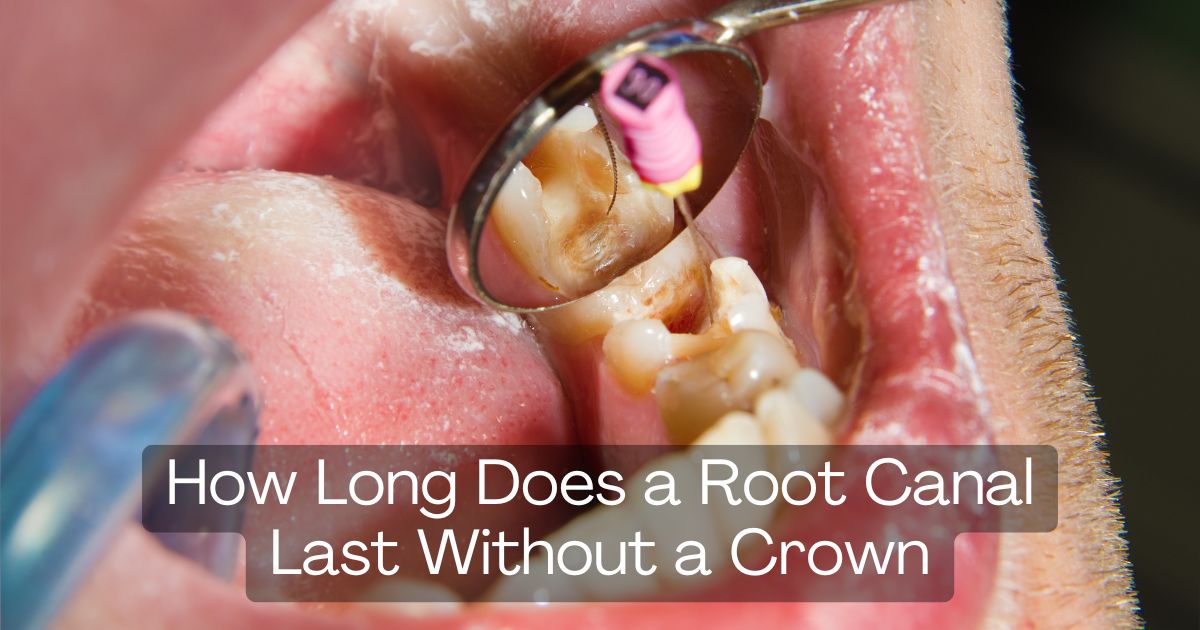Understanding how long does a root canal last without a crown is crucial for maintaining your oral health. This article delves into the longevity of a root canal-treated tooth without a crown, based on expert opinions and real-life examples. We will explore the potential risks, benefits of crowns, and alternative protective measures.
The Purpose of a Crown
Protection and Reinforcement
A crown reinforces a tooth that has undergone a root canal. After the procedure, the tooth may become brittle and prone to fractures. A crown acts as a protective shield, covering the entire tooth to maintain its strength and functionality. This protective measure helps prevent damage from everyday use.
Preventing Fractures and Damage
Teeth that have had root canals are more vulnerable to fractures. The crown helps distribute chewing forces evenly across the tooth, reducing the risk of cracks or breaks. Without a crown, the tooth is more susceptible to damage, which can compromise its long-term health.
Factors Affecting Longevity Without a Crown
Tooth Location and Usage
The location of the tooth plays a significant role in how long it lasts without a crown. Molars, which endure heavy chewing forces, are more likely to experience problems if left uncovered. Front teeth, facing less stress, may fare better but still face risks of damage and wear.
Oral Hygiene and Maintenance
Good oral hygiene can impact the longevity of a root canal-treated tooth. Regular brushing and flossing help prevent decay and gum disease. Consistent care reduces the risk of complications, though it does not eliminate the need for a crown entirely.
Dietary Habits and Lifestyle
Diet and lifestyle choices can influence the durability of a root canal-treated tooth. Avoiding hard foods and habits like teeth grinding can help protect the tooth. However, even with careful habits, the lack of a crown increases the risk of long-term issues.
Expert Opinions on Root Canals Without Crowns
Dentists’ Views on Longevity
Most dentists recommend crowns after a root canal. They believe that crowns provide essential protection, enhancing the tooth’s longevity. Without a crown, the tooth is at higher risk of fractures and infections, which can lead to further dental issues.
Case Studies and Real-Life Examples
Real-life cases show mixed outcomes for teeth without crowns. Some patients manage well, maintaining their tooth for years. However, others experience complications such as fractures or infections, highlighting the benefits of using a crown to ensure long-term success.
Alternative Protective Measures
If a crown is not an option, there are alternatives like onlays and inlays. These options cover part of the tooth and offer some protection. Composite fillings can also be used but may not provide the same durability as a crown.
Signs of a Failing Root Canal Without a Crown
Symptoms to Watch For
Signs that a root canal-treated tooth may be failing include pain, sensitivity, and swelling. Discomfort when chewing or visible damage can also indicate problems. Early detection and treatment are crucial to prevent further complications.
When to Seek Professional Help
If you notice any symptoms, consult your dentist promptly. They can perform an examination and determine the appropriate treatment. Regular check-ups are important for monitoring the health of a root canal-treated tooth.
Diagnostic Procedures
Dentists use various diagnostic tools, including X-rays, to assess the condition of a tooth. These tools help identify issues like fractures or infections. Early diagnosis can prevent more severe problems and ensure effective treatment.
Also Read: Vincent Pensabene Total Apex Sports
Comparative Analysis: Root Canal with vs. Without Crown
Longevity Comparison
Teeth with crowns generally last longer than those without. The crown provides reinforcement, reducing the risk of fractures and infections. Without a crown, the tooth is more likely to encounter issues that can shorten its lifespan.
Cost vs. Benefit Analysis
While crowns involve an initial cost, they offer significant benefits. The crown helps prevent fractures and infections, potentially saving money on future treatments. Evaluating the cost of a crown against its benefits is essential for making an informed decision.
Patient Experiences
Patient experiences vary based on whether they opted for a crown. Many report positive outcomes with crowns, including improved durability and function. Others who avoided crowns may face complications, emphasizing the importance of following dental recommendations.
Preventive Measures and Care Tips
Best Practices for Root Canal Maintenance
Maintaining oral hygiene is key for the health of a root canal-treated tooth. Brush and floss regularly to remove plaque and bacteria. Use an antimicrobial mouthwash to further reduce bacterial growth.
Importance of Regular Check-Ups
Regular dental visits are crucial for monitoring the tooth’s condition. Check-ups allow your dentist to detect potential issues early and address them before they become severe. Professional cleanings also help maintain oral health.
Tips for Reducing Risk Without a Crown
If you forgo a crown, protect your tooth by avoiding hard foods and using a nightguard if you grind your teeth. Watch for any changes in the tooth’s condition and seek dental care if needed.
Alternatives to Crowns for Root Canal Protection
Onlays and Inlays
Onlays and inlays are partial restorations that can protect a root canal-treated tooth. They cover specific areas of the tooth and are made from materials like porcelain. They offer some protection but may not be as durable as a full crown.
Composite Fillings
Composite fillings are used for minor restorations. They match the tooth’s color but provide less protection compared to crowns. They are suitable for less stressed teeth but may not be ideal for high-pressure areas.
Dental Bridges
Dental bridges replace missing teeth but are not typically used for protecting root canal-treated teeth. If a tooth is extracted or severely damaged, a bridge can restore functionality and appearance.
The Impact of Choosing Not to Use a Crown
Short-Term vs. Long-Term Outcomes
Choosing not to use a crown can lead to short-term satisfaction but may result in long-term issues. The risk of fractures and infections increases over time, which can lead to more extensive treatments or extraction.
Emotional and Financial Considerations
Not using a crown can lead to emotional stress and financial costs if complications arise. Investing in a crown initially can help prevent these issues and provide peace of mind.
Patient Perspectives and Testimonials
Patient testimonials offer insights into the outcomes of root canals with and without crowns. Positive experiences with crowns highlight their benefits, while negative experiences without crowns stress the importance of following dental advice.
Conclusion
In summary, how long does a root canal last without a crown is a crucial consideration, as placing a crown after a root canal is generally recommended to enhance the tooth’s longevity and prevent complications. While it is possible to manage a root canal-treated tooth without a crown, the risks are significant. A crown provides essential protection and helps ensure the tooth remains functional and healthy. Regular dental check-ups, good oral hygiene, and informed decision-making are key to maintaining your oral health.
FAQs
What are the benefits of placing a crown after a root canal?
A crown enhances the tooth’s strength, protects against fractures, and reduces infection risk. It helps maintain the tooth’s functionality and longevity.
Can I keep a root canal-treated tooth without a crown?
While possible, keeping a root canal-treated tooth without a crown is risky. The tooth is more prone to damage and complications without the protection of a crown.
What are the alternatives to crowns for protecting a root canal-treated tooth?
Alternatives include onlays, inlays, composite fillings, and dental bridges. Each offers varying levels of protection and may be suitable depending on the tooth’s condition.
How can I tell if my root canal-treated tooth is failing?
Signs include pain, sensitivity, swelling, discomfort when chewing, and visible damage. Early intervention is crucial to address potential issues promptly.
What should I do if I decide not to use a crown?
If you forgo a crown, maintain excellent oral hygiene, avoid damaging habits, and schedule regular dental check-ups. Monitor your tooth for any changes and seek professional care if needed.










